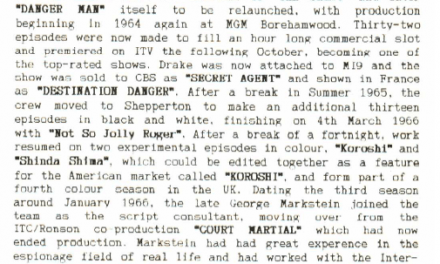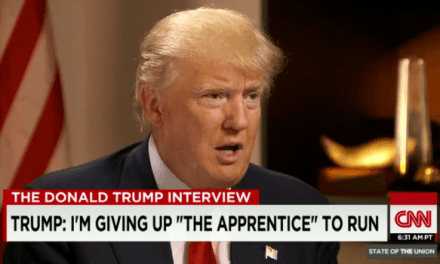It was the recent conference at Hastings, ‘Raymond Williams and John Logie Baird – Television, Technology and Cultural Form’, organized by Professor Deborah Philips of the University of Brighton, which sent me back to Bill Brand (Jack Shepherd), hero of Trevor Griffiths’ 1976 series, who, as newly elected Member of Parliament for Leighley, wrestled with the question of whether the House of Commons was the best place to make a push for his brand of revolutionary socialism.

Although the conference benefited from an excellent presentation from Ian Logie Baird of the National Media Museum about his grandfather’s period of residence in Hastings, most of the papers at the conference seemed to focus on Williams. A number of speakers, including Ros Brunt and Dave Laing, had been reading Williams’ television criticism, published in The Listener on a monthly basis from 1968-72 which is due to be re-published shortly. The criticism is well worth a study and shows that Williams was one of the few television critics who was open to engaging, critically, with the full range of television programmes watched in a domestic context. Gardening shows, entertainment shows, police series and adaptations all feature in what is in effect a kind of blog, written in response to what turns up on television and how it relates to a wider sense of politics. The essay ‘Most Doctors Recommend’ published in 1969 offers a thought-provoking defense of the possibilities of the television serial which is still worth reflecting on; serials, he suggests, at least offer the possibility of recognizing the continuity of a life as it is lived, ‘the experience of having to pick up and go on again through pressures which can’t be resolved by any stylish cut-off’. If we stopped despising serials, he says, ‘we may get to a position in which the facts of connection and consequence would be written as experience rather than as plot-calculation’ (O’Connor, 83).
My paper focused on his famous inaugural lecture given in 1974, ‘Drama in a Dramatised Society’. Its central statement still seems to me astonishing in its boldness, partly because Williams, who is taking a chair at the University of Cambridge, makes it as a statement of interesting fact rather than as opprobrium or lament:
‘What we now have is drama as habitual experience: more in a week, in many cases, than most human beings would previously have seen in a lifetime . . . What is it, we have to ask, in us and in our contemporaries, that draws us repeatedly to these hundred and thousands of simulated actions; these plays, these representations, these dramatisations?’ (O’Connor, 4/5)
I particularly like that ‘us’, not all the pioneers of film and television studies could have included themselves in that ‘us’.
Williams relates this absorption in television drama to the need ‘to watch what is happening “out there”’; there is a ‘need for images, for representations of what living is like now’. (6) The ‘slice of life, once a project of naturalist drama, is now a voluntary, habitual, internal rhythm’ (5).
The DVD of Bill Brand had been lying on my shelves for some time but reading Williams made me want to get it down and look again at this slice of political life. Bill Brand has not in that time been forgotten. Screened on a commercial channel in primetime it has an almost mythic status as an example of how radical television drama could be at this point. It is praised by Lez Cooke who records its use of video as being different from Play for Today’s use of film and John Tulloch gives an interesting account of how Bill Brand was received (surprisingly warmly) by the press. A number of websites praised it when the DVD came out in 2011 and it’s now available on Youtube.
But looking at it now was quite a shock. Screened on an HD widescreen tv, it looked so different from modern television drama and its topic was so arcane; did the need to watch what was happening “out there”, identified by Williams, include the bureaucratic minutiae of Labour Party pre-meetings? Did slice of life naturalism require 15 detailed minutes of a Parliamentary Select Committee? And so, rather than binge viewing, I took it very slowly until I gradually I got used to it again.
Quite apart from the politics, three things struck me in this re-viewing. Firstly, the use of space and in particular the use of a fixed camera in small, tight rooms, rooms which recall Williams’ reference to theatre’s ‘enclosed rooms, enclosed and lighted framed rooms’ (6). Although Cooke suggests Griffiths was trying to emulate the look of soap opera, the rooms seem darker, more meagre, more temporary. Indeed, we are often watching the characters making shift in temporary bedsits, seedy hotel rooms, shared offices and grubby side rooms (figs 2, 3 and 4); even in the sites of power (Parliament, Conference, the General Management Committee) the main action is apparently taking place elsewhere and is glimpsed on television or heard through a closed door. But here we are stuck, like Brand himself, on the side but knowing that we ought to be making an intervention.



Tied to that is the way in which the screenplay omits what we might expect to be central scenes. An argument, a show-down or an outcome is built up to but then skipped over. This makes for demanding viewing, particularly given an audience not necessarily familiar with the machinery of the Labour party and TUC, but it also both keeps the plot moving on and sidelines our expectations. We can see its use particularly consistently in episode 9, ‘Anybody’s’, when a leadership battle is being fought out. In one late night scene, Brand and David Last (Alan Badel), the Left candidate he is supporting for the Labour leadership, wait for the outcome of a ploy to outwit the Right. Waiting, off stage, they play chess in the office and the pause shifts the narrative onto their relationship.

The scene that follows jumps to the next day and the results of the first ballot. It’s left to the audience to work out the ramifications of the chess match and the ballot and the tensions at play for Brand in both.
The third element is speech. Griffith’s dialogue doesn’t sound like television dialogue. It reflects the rhythms and rhetoric of the revolutionary left of the 1970s and much of it sounds theatrical, as if characters are continually proclaiming their positions, in their private life as much as in public. They are making speeches not having conversations and they are making speeches to the audience as much as to each other. Although much of what is being said (particularly about gender politics) is brave and striking, the self-consciousness of Brand’s presentation, in particular, strikes an uncomfortable note. His speeches are different from those of many of the MPs and trade unionists who address each other (and us) in the series. Brand speaks down to people, whether it’s the women students at Ruskin College, the Parliamentary Committee on the Prevention of Terrorism Bill, his local team or his weary and vastly experienced regional officer (Brand has to hear from someone else that Albert fought against Franco in the Spanish Civil War). Bill Brand is clearly the hero but he sounds like the lecturer he is, trying to simplify his arguments and speaking at and down to his audience. Perhaps more than he knew, Trevor Griffiths in Bill Brand showed us not only the passion of politics and the machinery of its delivery but also demonstrated one of the reasons why Brand’s revolutionary left failed.

Bill Brand (written by Trevor Griffith and directed by Stuart Burge, Michael Lindsay-Hogg and Roland Joffé) is available on DVD and at http://www.youtube.com/watch?v=9YNzOl3Rom4
Christine Geraghty is an Honorary Professorial Fellow at the University of Glasgow and an Honorary Research Fellow at Goldsmiths, University of London. Her publications on television include a contribution to the 1981 BFI monograph on Coronation Street; Women and Soap Opera (Polity, 1991); and My Beautiful Laundrette (I B Taurus, 2004). Her BFI TV Classic on Bleak House (2005) will be published in October 2012. Her BFI TV Classic on Bleak House (2005) was published in October 2012. She is on the editorial board of the Journal of British Cinema and Television and sits on the advisory boards of a number of journals, including Screen.





